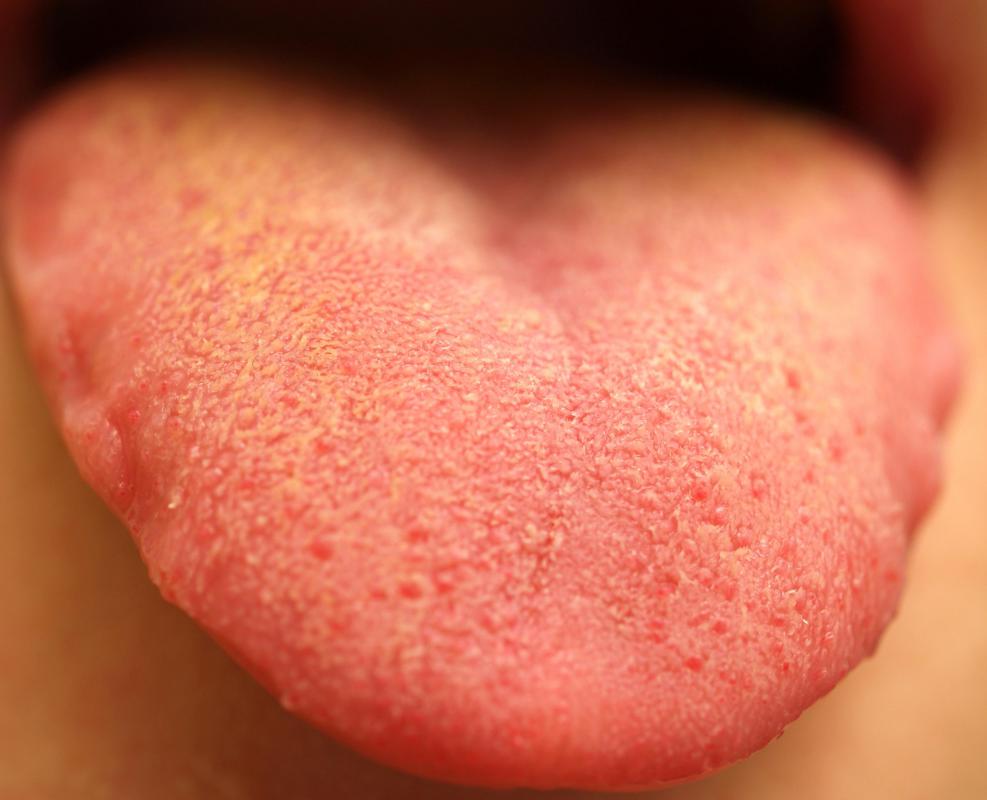At WiseGEEK, we're committed to delivering accurate, trustworthy information. Our expert-authored content is rigorously fact-checked and sourced from credible authorities. Discover how we uphold the highest standards in providing you with reliable knowledge.
What is Dry Mouth Syndrome?
Dry mouth syndrome, also known as xerostomia, is a condition in which the amount of saliva in your mouth has decreased, resulting in a dry, uncomfortable feeling. There are several other symptoms that occur in tandem with dry mouth syndrome. These include thick, stringy saliva, a rough dry tongue, sore throat, bad breath, difficulty swallowing, dry cracked lips, split skin at the corners of the mouth and a burning sensation in the mouth. Whether or not this condition is permanent depends on the reason why your salivary glands are malfunctioning.
There are three factors that can cause a decrease in the amount of saliva in your mouth: medicines, medical problems and emotional stress or anxiety. Sometimes, more than one of these occur at a time, increasing the possibility of experiencing dry mouth syndrome. For example, you may have a medical disorder that results in dry mouth syndrome and be prescribed a medication that increases the degree to which you experience it.

There are over 400 medications that may cause dry mouth syndrome, including muscle relaxants, high blood pressure medicine, antihistamines, decongestants, anti-depressants and medicines for Parkinson's disease. Chemotherapy and radiation treatments also cause xerostomia because they dry out the salivary glands, directly reducing the amount of saliva produced in your mouth. When taking any of these medications, it is recommended that you inform your dentist so he can pay special attention to any of the side effects this condition may have on your oral health.

Many medical conditions result in dry mouth syndrome. The most common condition is Sjogren's syndrome, an autoimmune disease that affects all the moisture-producing glands in your body, resulting in dry eyes and a dry mouth. Other medical problems that cause xerostamia are diabetes, strokes and Alzheimer's disease.
Anxiety and depression are very common problems that many people face on a daily basis. These disorders often result in dry mouth syndrome. When combined with anxiety and anti-depression medications, the symptoms increase.

If you experience symptoms of xerostomia, you should talk to your dentist. He will examine your mouth for any problems that may have resulted from this condition, such as cavities, irritation and infection. If the situation is severe, you may be referred to a periodontist for treatment. A couple of simple treatments to lessen the side effects of xerostomia are sucking on sugar-free candies, specially formulated mouth rinses, artificial saliva, oral moisturizing sprays and, if necessary, medication to increase the production of saliva.
AS FEATURED ON:
AS FEATURED ON:














Discussion Comments
@turkay1-- Stress sounds like the cause of my dry mouth too.
I haven't been able to see my family doctor yet because I'm at college. I did see the doctor at the campus health center though and she suggested me to think about my favorite food when this happens. This is supposed to cause me to produce saliva and resolve the dry mouth problem temporarily.
I've been trying it and I think it really works! I think about a nice juicy hamburger and it causes my mouth to produce saliva! I know it's not a long term treatment. I will also need to learn some stress relief exercise but for now it helps.
I have dry mouth due to anxiety. I've been having to do a lot more presentations at work lately and every time I get ready to do one, my mouth becomes extremely dry. I am unable to get through a presentation without sipping on a bottle of water. And if I forget the water, I gulp every few minutes which is so distracting when I want to concentrate on what I want to say.
I finally went to my doctor about it and he asked me if it happens at any other time. I thought about it, and no, it doesn't. It only happens before my presentations. He said that it is probably due to stress and anxiety and told me that if there is no underlying medical condition, dry mouth symptoms can be related to the natural flight response that gets activated when we're stressed out.
He had me go to a psychologist who agrees with my family doctor. He's been teaching me some stress-relief exercises that I can do in my office before a presentation to relieve some of that stress and tension. I really hope it works!
One of the first symptoms I had as a diabetic was dry mouth. I would feel thirsty all the time and drink a lot of water but the dryness of my mouth just wouldn't go away.
It turns out that when blood glucose levels are constantly high, it causes dehydration which in turn causes dry mouth syndrome.
My diabetes is being treated right now and I'm taking my medications regularly. I'm drinking less water but I still have dry mouth syndrome. I have checked the side effects list of my medication and it does list dry mouth. I guess I'm going to have to just get used to it. Chewing gum and drinking natural mineral water does seem to provide some dry mouth relief though.
Post your comments